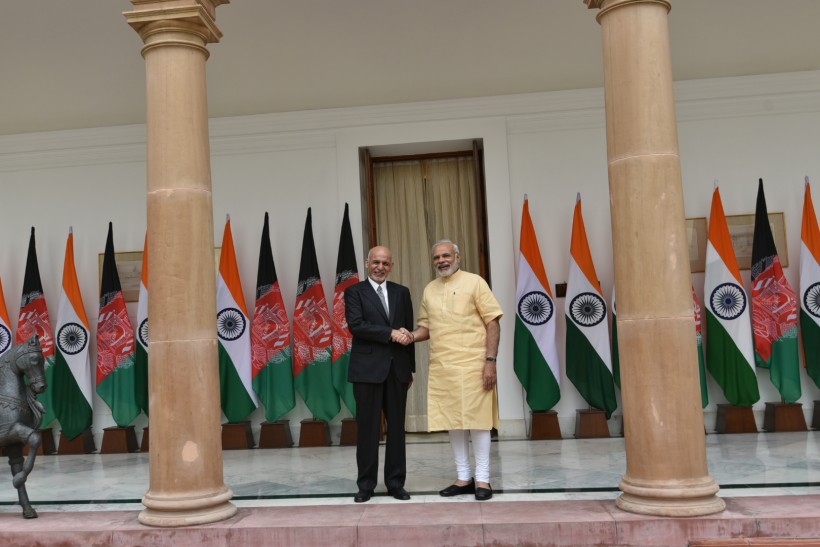
Ghani in Delhi, Modi offers $1 bn aid
India has offered Afghanistan a fresh $1 billion in economic assistance after Prime Minister Narendra Modi and President Ashraf Ghani met in New Delhi today and discussed wide ranging issues of mutual and regional interest.
India is the fifth largest bilateral donor in Afghanistan. It has been a key supporter of Kabul’s government and has poured more than $2 billion into the country since the Taliban was toppled in 2001.
Prime Minister assured his host of Delhi’s commitment to helping the war-torn country strengthen its education, health, agriculture and other sectors. In a joint statement the two leaders called for an end to sponsorship and support of militants. Pakistan was not identified by name though.
“The two leaders discussed the regional situation and expressed grave concern at continued use of terrorism and violence in the region for achieving political objectives,” Foreign Secretary S Jaishankar said.
.“They called upon the concerned to put an end to all sponsorship, support, safe havens and sanctuaries to terrorists, including for those who target Afghanistan and India,” he told reporters.
Marking the visit, both countries exchanged several agreements on extradition, mutual legal assistance treaty, and peaceful uses of outer space.
Terrorism as a Medium Term Challenge
Speaking at the Institute for Defence Studies and Analyses (IDSA) later in the evening, the Afghan leader, who is an anthropologist by training, reflected on the current global state of affairs. He termed terrorism as a medium term challenge. And called for a fundamental change in the regional and global response through improved information sharing and regional understanding, increased state level cooperation, and greater role of civil society and businesses.
The subject of his lecture was ‘Fifth Wave of Political Violence and Global Terrorism’.
Describing the ‘fifth wave’ as probably one of the “most well-financed movements in history” President Ashraf Ghani observed that “in the absence of rules of the game”, and due to the willingness of some states to sponsor non-state actors, the phenomena has evolved over the years with deepened and broadened techniques. The understanding of the current political violence has largely been reactive, due to which global actions have been sporadic and not sustained, he opined.
Networking is a striking feature of the fifth wave, the Afghan president said and added the terrorist networks that previously used to be face-to-face or in small groups have now become face-to-faceless, resulting in a distinct form of mobilisation.
Political violence is not owned by a specific culture, religion or geographic space, and requires careful analysis. Criminality and political violence have become organically related, Ghani said, pointing out “there is a distinctive form of violence that is inflicted on the citizens and that results in erosion of state authority”.
President Ghani noted that the terrorists target public spaces to disrupt the compact between the citizens and the State. “The objective is to induce fear in a systematic manner which effectively breaks the bond of trust between citizens and State.”
-
CHINA DIGEST
-
 ChinaChina Digest
China’s PMI falls for 3rd month highlighting challenges world’s second biggest economy faces
ChinaChina Digest
China’s PMI falls for 3rd month highlighting challenges world’s second biggest economy faces
-
 ChinaChina Digest
Xi urges Chinese envoys to create ‘diplomatic iron army’
ChinaChina Digest
Xi urges Chinese envoys to create ‘diplomatic iron army’
-
 ChinaChina Digest
What China’s new defense minister tells us about Xi’s military purge
ChinaChina Digest
What China’s new defense minister tells us about Xi’s military purge
-
 ChinaChina Digest
China removes nine PLA generals from top legislature in sign of wider purge
ChinaChina Digest
China removes nine PLA generals from top legislature in sign of wider purge
-
-
SOUTH ASIAN DIGEST
-
 South Asian Digest
Kataragama Kapuwa’s arrest sparks debate of divine offerings in Sri Lanka
South Asian Digest
Kataragama Kapuwa’s arrest sparks debate of divine offerings in Sri Lanka
-
 South Asian Digest
Nepal: Prime Minister Dahal reassures chief ministers on police adjustment, civil service law
South Asian Digest
Nepal: Prime Minister Dahal reassures chief ministers on police adjustment, civil service law
-
 South Asian Digest
Akhund’s visit to Islamabad may ease tensions on TTP issue
South Asian Digest
Akhund’s visit to Islamabad may ease tensions on TTP issue
-
 South Asian Digest
Pakistan: PTI top tier jolted by rejections ahead of polls
South Asian Digest
Pakistan: PTI top tier jolted by rejections ahead of polls
-






Comments